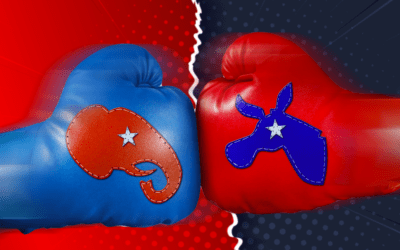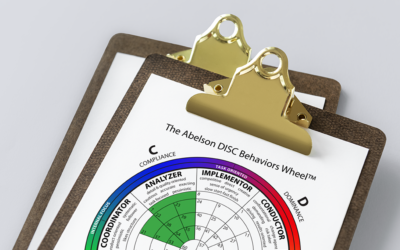We all experience and handle stress in different ways. “Stress, it’s just a state of mind. I have it under control” (says the confident “D” style). “I can handle the stress” (says the optimistic “I” style). “Yes, I am feeling a little stressed” (says the sensitive “S” style). “Stress, who is stressed” (asks the heady “C” style)?
One of the great things about the D, I, S, C approach to behavior is that it gives us significant insight how different people behave, and more importantly, what to do regarding that behavior. Most DISC approaches measure two different types of behaviors. Behaviors are referred to as “Adapt” when the behavior we exhibit is because we think we are supposed to behave that way. This is the usual, non-stressed behavior, we exhibit at work or for whatever environment (work, social, family, etc.) with which you were directed to answer the assessment questions. “Natural” behavior occurs when we are by ourselves, with someone we highly trust,
OR, when we are under stress. So, in most cases, the “Natural” behavior is what we will see from the person when they are experiencing stress. Why? Because we don’t have the psychic energy to keep the “Adapted” behavior mask on. Also, please keep in mind, that even if you have a zero score for one of the four basic behavior categories, you still have some of the behaviors of
that style. It’s just that other styles take precedence in how you behave, not that you don’t have any of that particular style.
Let’s look at a few ways each style deals with stress. If you would like more information, we have a multi-hour short video and webinar series on our Abelson Learning Resource Network (A-LRN) site. Visit us there.
How the DISC “D” Style Conquers Stress
There are many ways the direct, decisive, demanding, and directive “D” behavior style effectively deals with stress. One of the most direct is to exercise. The exercise allows them to rid themselves of some of the energy that propels them. It helps take a little of the “edge” off. They may cycle, lift weights, walk, just stretch in place, or a dozen of other activities. The issue is to release some of the energy, negative emotions, or other things going on in their mind and body.
One of the other things that creates stress for the “D” behavior style is feeling out of control. The issue is “feeling” out of control. Any technique that helps the “D” feel more in control will sooth and decrease the emotional response to the stress. One of the best techniques for a “D” to handle this lack of control, is to focus their attention on dealing with an issue for which they do have control. We don’t have control of the Covid-19 virus, but we do have control on how we respond to it. Staying at home, wearing a mask when going places where other people will be, and staying a safe distance away from others ARE things the “D” can control. Or, doing something totally unrelated to the Covid-19 virus, can also help. I have quite a bit of “D” and “I” in me. I find that focusing on work helps me deal with my stress (writing this article, for example), because I am doing something that is within my control.
How the DISC “I” Style Conquers Stress
Just imagine a Jim Carey like individual with stress. Their optimism, enthusiasm, talkative, and convincing style won’t let them succumb to anything as negative as stress. Or would it? Of course, it would. In situations where they have to stay away from people for a while, their stress reaction is particularly obvious. Their stress is usually displayed by talking more or socializing more. The “I’s” stress frequently comes from a feeling of emotional disconnectedness. Situations that decrease energy levels may also create stress for the “I” behavior style.
The best strategies to decrease stress for an “I” is to increase emotionally laden situations and/or to help them feel more connected to others. Look for fun-like situations. Listening to comedy radio or watching a funny video or movie will decrease their stress. Giving them an opportunity to interact with friends or others that they like, will also help them deal with the stress. Just going to a place where there are other people around and/or a high energy environment will also help decrease the negativity they are experiencing. Using technologies, such as Facebook and any type of on-line meeting platform, are other techniques that increase their feeling of connectedness and energy level. The
more the “I” focuses on the positive emotionality of the situation, the better.
How the DISC “S” Style Conquers Stress
How would Alfred in the Batman series deal with stress? As he usually does, by helping others, notably Batman. His systematic, steady, understanding, team player approach would prevail. But everyone experiences stress, so what might stress Alfred or any “S”? Having too much change going on at one time or not having family or other support is stressful. Fortunately for Alfred, Batman is always appreciative of the support he receives from Alfred. Additionally, Batman is usually fighting only
one enemy at a time. If there were multiple enemies at the same time or Alfred had to go from one situation to another quickly, his stress level would increase significantly.
There are a number of ways to help the “S” decrease stress. Their stress is usually caused by overwhelming emotions and intense energy levels. This is especially
so, if the overwhelming and intensity comes from someone close or important to them. The “S” wants to please while giving support. One of the best techniques is to give the “S” a chance for a time out, or time to decompress. This allows them to calm themselves down,
come up with a plan, and show the composure necessary to be supportive in troubling times. Another way to help decrease the “S’s” stress is to create a structure they
can follow or give them the steps to take to get to the end point. “S’s” greatly appreciate a “road map.” When they have one, either one they designed or preferably designed by someone else, they usually successfully systematically handle the situation. They reestablish calm and stability, which helps them feel much better. The stress is significantly decreased.
How the DISC “C” Style Conquers Stress
The competent Dr. Spock (from Star Trek fame) and Albert Einstein fear nothing, other than making a mistake, of course. Could you imagine the stress Spock or Einstein (who most people believe was the smartest person ever to live) made a mistake. The earth would crumble! Or, at least, it would feel that way to them.
Making a mistake or being wrong are things the “C” behavior style fears. That is why they frequently need things to be perfect before they are ready to move on to the next task.
How can we decrease the stress for the “C?” One of the best ways is to ask them to give you various alternatives
to solving a problem, and then having someone else make the final decision. This releases the pressure of them possibly being wrong. Sometimes the stress for the “C” style is because the initial expectations
were not clear. Clarify the task or expectations at the beginning of the project or at other times in the project. This decreases the chance of making a mistake as well as gives the “C” direction, something they greatly appreciate. Finally, giving the “C” feedback as they are progressing with a task or project also helps decrease making a mistake. At the least, it lessens the type of mistakes that are made. The more you can decrease the “C’s” fear of being wrong, the less stress they will experience.
Behaviors Are Complex
The narratives above present behavior style as if there are only four such styles. We all know everyone is different. At the same time, one style may be dominant or the person may display several styles all at once.
The extent they have more than one of the major styles allows you to try a technique that helps decrease stress of the other major style(s). Or, you can be creative and develop your own techniques, now that you also know what drives the behavior of each of the four major styles.




